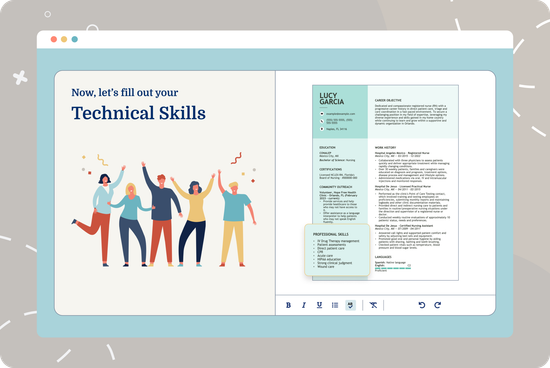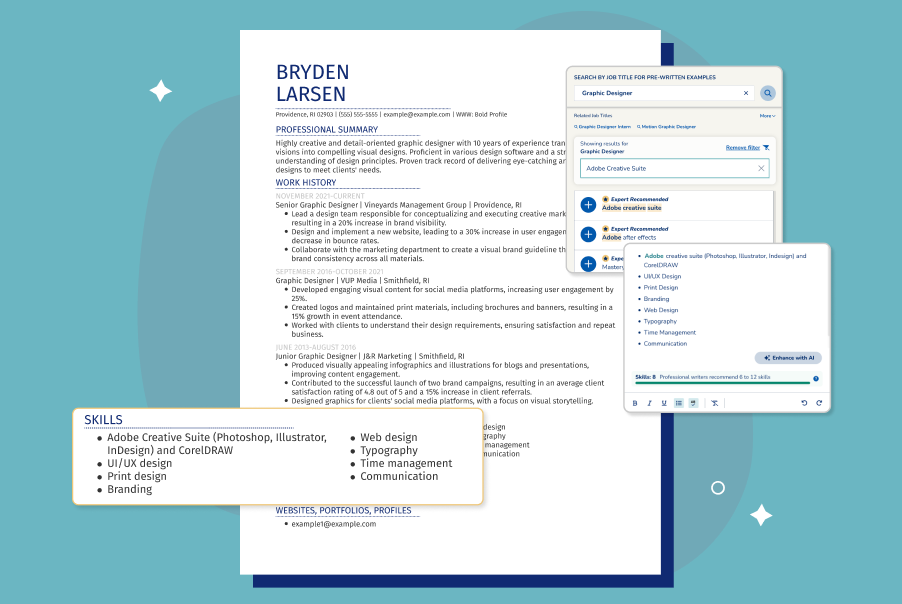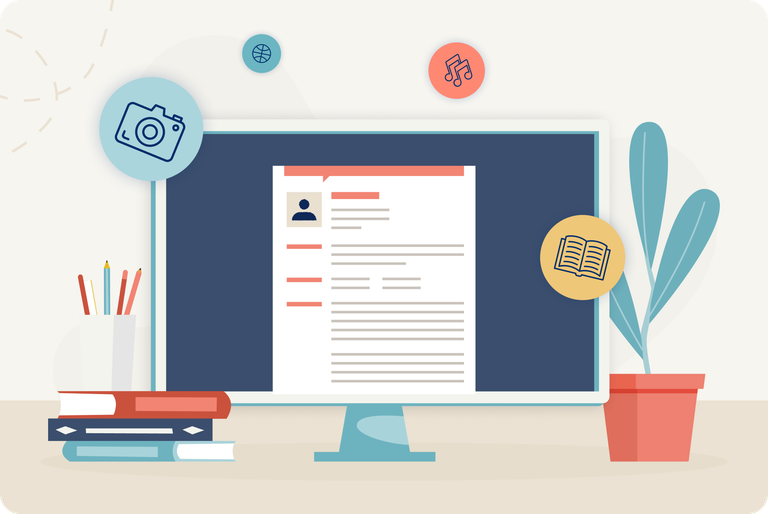100+ Essential Technical Skills for Your Resume & Tips to Showcase Them

Our customers have been hired at: *Foot Note
AI Resume Skills Generator

In today’s competitive job market, possessing the right technical skills can significantly enhance your chances of landing your dream job. Whether you are an experienced professional or a recent graduate, this page is designed to provide you with valuable insights and strategies to effectively highlight your technical expertise on your resume.
From programming languages to software proficiency, we will explore the variety of technical skills for a resume that potential employers value. By leveraging this knowledge and showcasing your technical skills on your resume effectively, you can create a compelling resume that sets you apart from other candidates.
In this guide, we will provide examples of technical skills and we’ll answer these burning questions:
- What are technical skills?
- Why are technical skills important?
- What are good technical skills for a resume?
- What are the best technical skills to list on a resume for top jobs?
- What are key technical skills for a resume by industry?
- How to write technical skills in a resume?
So what are we waiting for? Let’s dive in and discover how to make your technical skills shine on your resume!
Make a resume with MyPerfectResume
Our Resume builder can help you write the perfect resume. Start Now!
What are technical skills?
Technical skills refer to a specific set of abilities and knowledge related to a particular field or industry. They are typically acquired through formal education, training programs, certifications or hands-on experience.
In the professional world, technical skills are highly valued by employers as they demonstrate an individual's ability to effectively perform job-related tasks and contribute to the success of an organization.
Having technical skills on your resume shows potential employers that you can solve complex problems, execute specialized tasks and adapt to technological advancements within your field.
Video: Soft Skills and Hard Skills
Examples of technical skills
Technical skills are practical and tangible, allowing individuals to perform specific tasks or functions within their respective domains.
Some technical skills examples include:
- Website development
- Data analytics
- Programming languages
- Asset management
- Digital illustration
- Financial documentation
- UX/UI design
- Technical writing
In today's rapidly evolving job market, possessing relevant technical skills is crucial for staying competitive and securing employment opportunities in various industries.
Why are technical skills important?
Technical skills demonstrate your ability to navigate and utilize the latest technologies and tools relevant to your field. In an increasingly digital world, employers seek candidates who can adapt to new software, programming languages and emerging technologies.
By showcasing your technical skills on your resume, you convey your proficiency in these areas, making you a valuable asset to potential employers. Technical skills also enhance your problem-solving capabilities.
Many technical roles require individuals to troubleshoot issues, analyze complex data and develop innovative solutions. Strong technical skills equip you with the knowledge and expertise to tackle challenges efficiently and effectively.
Potential employers value candidates who can think critically and find practical solutions to problems, and highlighting your technical skills on your resume demonstrates your ability to do just that. Technical skills not only enhance productivity and efficiency but also contribute to innovation and growth.
Good technical skills for a resume
As technology continues to advance, the demand for professionals with strong technical expertise is on the rise. Whether you are a software developer, data analyst, or IT specialist, having a solid foundation of technical skills can make a significant difference in your career prospects.
From programming languages and database management to cloud computing and cybersecurity, we will delve into the key technical skills that can make your resume stand out from the competition. By highlighting these in-demand skills, you can demonstrate your ability to navigate complex technological landscapes and contribute effectively to any organization. Let's explore the world of good technical skills and discover how they can elevate your resume to new heights.
The following is a broad list of 20 highly sought-after general technical skills for a resume for today's competitive, technologically-driven job market.
- Programming Languages (e.g., Java, Python, C++)
- Web Development (HTML, CSS, JavaScript)
- Database Management (SQL, MySQL, Oracle)
- Cloud Computing (AWS, Azure, Google Cloud)
- Network Administration (TCP/IP, DNS, DHCP)
- Cybersecurity (Firewalls, Intrusion Detection Systems)
- Data Analysis (Excel, R, Tableau)
- Machine Learning (TensorFlow, scikit-learn)
- Mobile App Development (iOS, Android)
- Agile Methodologies (Scrum, Kanban)
- DevOps (Continuous Integration, Docker)
- UI/UX Design (Adobe XD, Sketch)
- Project Management (PMP, Agile Project Management)
- Quality Assurance (Test Automation, Bug Tracking)
- Big Data Technologies (Hadoop, Spark)
- Linux System Administration
- IT Support and Troubleshooting
- Virtualization (VMware, Hyper-V)
- Robotics and Automation
- Technical Writing and Documentation
Technical skills by job title
No matter what job you’re going for, displaying technical skills on your resume can give you a competitive edge in today’s job market.
Technical skills are highly valued in the workplace because they:
- Enhance productivity and efficiency
- Enable problem-solving and critical thinking.
- Facilitate innovation and adaptability
- Improve collaboration and teamwork
- Increase job opportunities and career growth
Don’t just add any technical skills to your resume. Only add your most job-relevant technical skills. Your resume technical skills will depend on the job title, industry and level of expertise needed for the job. Some technical skills can be applied across industries.
We’ve divided the following list of technical skills for a resume by job title so you can find the best technical skills for your resume.
Software Developer
- Proficiency in programming languages such as Java, Python, C++, or JavaScript
- Experience with software development frameworks like React, Angular, or Django
- Knowledge of database management systems such as MySQL or MongoDB
- Familiarity with version control systems like Git or SVN
Data analyst:
- Proficiency in data analysis tools such as SQL or R
- Experience with data visualization tools like Tableau or Power BI
- Knowledge of statistical analysis techniques and tools such as Excel or SPSS
- Familiarity with data cleaning and manipulation using Python or Pandas
Related guide: Essential Data Analyst Skills for Your Resume
Network administrator:
- Proficiency in network protocols such as TCP/IP, DNS, or DHCP
- Experience with network monitoring and troubleshooting tools like Wireshark or Nagios
- Knowledge of network security principles and technologies such as firewalls or VPNs
- Familiarity with network configuration and administration using Cisco or Juniper devices
Web designer:
- Proficiency in HTML, CSS and JavaScript for front-end development
- Experience with responsive design frameworks like Bootstrap or Foundation
- Knowledge of graphic design tools such as Adobe Photoshop or Illustrator
- Familiarity with user experience (UX) principles and usability testing techniques
Systems administrator:
- Proficiency in operating systems like Windows Server or Linux
- Experience with virtualization technologies such as VMware or Hyper-V
- Knowledge of server hardware and network infrastructure components
- Familiarity with scripting languages like PowerShell or Bash for automation tasks
Cybersecurity analyst:
- Proficiency in cybersecurity frameworks and standards such as NIST or ISO 27001
- Experience with vulnerability assessment and penetration testing tools like Nessus or Metasploit
- Knowledge of network security protocols and technologies such as IDS/IPS or SIEM
- Familiarity with incident response procedures and forensic analysis techniques
UX/UI designer:
- Proficiency in user interface (UI) design tools like Sketch or Adobe XD
- Experience with user research techniques such as interviews or usability testing
- Knowledge of interaction design principles and information architecture
- Familiarity with prototyping tools like InVision or Figma
Database administrator:
- Proficiency in database management systems such as Oracle, SQL Server, or MySQL
- Experience with database design, normalization and optimization techniques
- Knowledge of backup and recovery procedures and database security measures
- Familiarity with SQL scripting and query optimization
IT project manager:
- Proficiency in project management methodologies such as Agile or Waterfall
- Experience with project management tools like Jira or Microsoft Project
- Knowledge of risk management and change control processes
- Familiarity with budgeting and resource allocation in IT projects
Cloud engineer:
- Proficiency in cloud platforms such as AWS, Azure, or Google Cloud
- Experience with infrastructure-as-code tools like Terraform or CloudFormation
- Knowledge of containerization technologies like Docker or Kubernetes
- Familiarity with cloud security best practices and monitoring tools
Pro tip
Stay updated with emerging technologies in your field and continuously learn new technical skills for your resume to increase your employability.
Technical skills by industry
The technical skills required for an industry depend on the individual needs of the industry, the job title and the level of expertise needed. Some resume technical skills can be applied across industries.
We’ve compiled the most in-demand examples of technical skills for a resume and categorized them by industry, below.
Information technology (IT):
- Programming languages (e.g., Python, Java, C++)
- Cloud computing (e.g., AWS, Azure)
- Cybersecurity and network security
- Data analysis and visualization (e.g., SQL, Tableau)
Healthcare:
- Electronic Health Records (EHR) systems
- Medical imaging and analysis software
- Health informatics and data management
- Telemedicine and remote patient monitoring
Related guide: Healthcare Skills for a Resume (Examples & Guide)
Finance:
- Financial modeling and analysis
- Risk management and compliance software
- Algorithmic trading and quantitative analysis
- Blockchain technology and cryptocurrency
Engineering:
- Computer-aided design (CAD) software
- Finite Element Analysis (FEA) tools
- Internet of Things (IoT) and embedded systems
- Robotics and automation technologies
Marketing and advertising
- Search Engine Optimization (SEO)
- Social media analytics and advertising platforms
- Marketing automation tools
- Data-driven marketing and analytics
Education:
- Learning Management Systems (LMS)
- Educational software development
- Virtual and augmented reality in education
- Gamification and interactive learning technologies
Related guide: Education Worker Skills for a Resume (Examples & Tips)
Manufacturing:
- Computer Numerical Control (CNC) programming
- Industrial robotics and automation
- Supply chain management software
- Quality control and Six Sigma methodologies
Retail:
- Point of Sales (POS) systems
- E-commerce platforms and website development
- Inventory management software
- Customer relationship management (CRM) tools
Energy and sustainability:
- Renewable energy systems and technologies
- Energy management and monitoring software
- Environmental impact assessment tools
- Smart grid and energy storage solutions
Media and entertainment:
- Video editing and production software
- Animation and visual effects (VFX) tools
- Content management systems (CMS)
- Augmented reality (AR) and virtual reality (VR) development
Looking for remote IT jobs? Our sister company, FlexJobs, updates listings daily with verified remote jobs. Find full-time and part-time IT jobs with FlexJobs.
How to list technical skills on a resume
When writing a resume, you must tailor it to the target job, so read the job description closely and highlight the technical skills that match your proficiencies. You can mention technical skills throughout your resume. How you showcase them depends on where you list them.
How to add technical skills to a resume professional summary
When mentioning technical skills in a resume summary or objective statement, provide a concise and impactful overview of your technical expertise.
Here are seven tips to effectively include technical skills in a resume summary:
- Be specific. Instead of simply stating "technical skills," mention the exact skills that are relevant to the job you are applying for. These keywords will help your resume get past ATS software and into the hands of a hiring manager. For example, if you are applying for a software developer job you could mention skills like Java and MySQL.
- Highlight proficiency. If you have advanced proficiency in certain technical skills, mention it in your summary. For example, you could say "Highly skilled in Java programming and MySQL for web applications and database management.”
- Quantify your experience. Whenever possible, quantify what you’ve accomplished with technical skills for your resume. For example, you could mention the number of years of experience you have in a specific programming language or the number of projects you have completed using a specific tool or framework.
- Include certifications or training. If you have obtained relevant or completed training programs in specific technical skills, mention them in your resume. Certifications can give you credibility and help you stand out.
- Keep it concise. Remember that a resume summary should be brief and to the point. Focus on the most relevant technical skills for a resume in your field and avoid listing skills that may not be directly related to the job you are applying for.
- Use action verbs to describe how you made an impact with your technical skills. Action words help your skills shine because they describe how you used the skills, showing potential employers what you’re capable of doing for them.
- Show you’re up to date. Mention your efforts to stay current with the latest technology trends. This could include attending workshops, participating in online courses or joining professional organizations.
Pro tip
Resume examples are excellent tools for generating ideas for your resume summary or objective statement. They can provide content and formatting guidance, industry language and creative inspiration.
How to list technical skills in a resume skills section
No matter which resume format you choose, every resume template includes a dedicated section for displaying skills.
Here are five tips for highlighting your technical skills in your resume skills section effectively.
- Pay attention to formatting: Organize your resume technical skills clearly and concisely so they are easy to read. Use bullet points to highlight each skill.
- Tailor your technical skills to the job description: Review the job description and identify the specific technical skills for your resume that are relevant to the position. Include those skills prominently in your resume.
- Categorize your technical skills on your resume: Group your technical skills into categories such as programming languages, software applications, operating systems or technical skills. This helps employers quickly identify your areas of technical expertise.
- Specify proficiency levels: On your resume, indicate your level of proficiency for each technical skill. You can use terms like basic, proficient, and advanced to describe your skill level. Be honest and accurate in your self-assessment.
- Be specific: Highlight specific software and tools. For example, "Proficient in Microsoft Azure and Google Cloud.”
A great way to make your technical skills stand out from your hard skills and soft skills is to create a separate category for them within your resume skills section. Our Resume Builder makes it easy to customize your resume skills section.
How to add technical skills in a resume work experience section
The work history section of a resume is an opportunity to showcase your technical skills in action. By providing specific examples on your resume of how you have used your technical skills in previous jobs and focusing on results, you can effectively highlight your technical skills in your resume job history section and demonstrate your potential to hiring managers.
- Format your employment history section with bullet points. Displaying your work experience this way makes it easier for hiring managers to scan your resume for specific technical skills. Highlight key technical skills and achievements so they stand out, and provide clarity so potential employers can identify your qualifications quickly.
- Highlight relevant projects or achievements. If you have completed any projects or achieved notable results using your technical skills, mention them in your work experience section. This demonstrates the practical application of your skills.
- Focus on results. Emphasize how your technical skills directly contributed to achieving business goals or solving problems. For example, mention how you used your programming skills to automate a manual process, resulting in time or cost savings for the company.
- Use numbers to show your impact. Numbers provide context and demonstrate your impact in former jobs with your technical skills. For instance, mention the size of datasets you worked with, the percentage of performance improvement you achieved, or the number of users impacted by your work.
- Mention relevant projects. If you have worked on special projects that required specific technical skills, provide a brief description of the project, your role in it and the technical skills you used to complete it. Highlight the technologies, tools and methodologies you utilized to successfully complete the project.
- Write short, punchy statements. While it's important to provide enough detail, be mindful of keeping your bullet points concise and easy to read. Use bullet points instead of lengthy paragraphs and focus on the most relevant and impactful information.
Key takeaways
Now that you know the best technical skills for your resume, you’re probably eager to build your resume. Before you do, don’t forget the following important points.
- The technical skills on your resume must be relevant to the job you’re applying to.
- Distributing your technical skills throughout your resume can help you stand out.
- Display hard and soft skills along with your technical skills on your resume.
- An excellent way to highlight specific technical skills on your resume is to group them into categories.
- Use numbers in your professional summary and work history section to emphasize the impact you have made with your technical skills.
- Stay up to date on the latest technological trends in your industry.
FAQ
What common technical skills should I include on my resume?
The technical skills for your resume should be relevant to the job you are applying for. This may include computer programming, robotics, augmented reality or cryptocurrency.
How do I showcase my technical skills on a resume?
Here’s how to put technical skills on a resume. First, compile a list of technical skills for your resume based on the job requirements, then add them to your resume summary or objective statement, throughout your job history section and in a separate resume skills section. In your skills section, you can use bullet points to highlight specific skills and their level of proficiency, such as “Advanced Excel skills” or “Proficient in Adobe Photoshop.”
Should I include basic technical skills on my resume?
Yes, basic technical skills for a resume are important if they are relevant to the job. Basic technical skills such as technical writing, project management and data analysis can demonstrate your overall technical prowess.
Should I mention certifications or training related to technical skills in my resume?
Absolutely! Including certifications or specialized training related to technical skills on a resume can add credibility to your resume. Mention any relevant certifications or training programs you have completed.
How can I demonstrate my technical skills in my resume work experience section?
Incorporate your technical skills into your work experience by describing specific projects or tasks where you utilized those skills. For example, mention how you used data analysis tools to analyze and present findings.
How important is staying updated with the latest technology trends?
Staying up to date with the latest technology trends is crucial in today’s rapidly evolving digital landscape. Employers value candidates who are willing to learn and adapt to new technologies.
Do I need a cover letter if I showcase my technical skills in my resume?
Yes! Always write a cover letter as a complement to your resume. Cover letters tell hiring managers that you’re serious about the job because you’re willing to go the extra mile.
How to describe resume technical skills in a cover letter?
To explain your technical skills when writing a cover letter, it is important to highlight your proficiency and relevant experience with various software, tools and technologies.
To describe your resume technical skills in a cover letter:
- Be specific: Mention the job-relevant technical skills and tools you possess that are relevant to the job you are applying for. For example, your proficiency in programming languages, software applications, data analysis tools or project management software.
- Provide examples: Back up your claims by providing specific examples of how you have used your technical skills in previous roles or projects and what the result was. Don’t hold back! Highlight any achievements or outcomes demonstrating your proficiency and the value you can bring to the position, but don’t regurgitate your resume.
- Match job requirements: Just like you should when writing resume technical skills, tailor your technical skills to the job requirements mentioned in the job posting. This shows that you have taken the time to understand the specific needs of the role and can effectively contribute to the organization.
How do I highlight my technical skills in a job interview?
Hiring managers will likely ask you about your resume technical skills when you make it to the job interview.
Here’s how to talk about your technical skills when interviewing for a job:
- Prepare: Before the interview, review the job description and identify the specific technical skills that are mentioned or required. Make a list of your own technical skills and experiences that are relevant to the role.
- Put them in contect: During the interview, provide specific examples of the technical skills you possess. Instead of simply stating that you are proficient in a certain software or programming language, elaborate on how you have used it in previous roles or projects and the outcomes you achieved.
- Showcase your experience: Highlight any projects or accomplishments where your technical skills played a significant role.
- Soft skills: Besides resume technical skills, mention any soft skills that complement your technical skills, such as problem-solving, attention to detail or effective communication. These skills demonstrate your ability to apply your technical skills in a practical and efficient manner.
Provide references: Before you end the interview, offer references who can vouch for your technical skills (and other qualifications). This can add credibility to your claims and reassure the interviewer of your abilities.
How we reviewed this article
Since 2012, we have helped more than 11 million job seekers. We want to make your career journey accessible and manageable through our services and Career Center’s how-to guides and tips. In our commitment to bring you a transparent process, we present our Editorial Process.
Sources
Our customers have been hired at:*Foot Note






